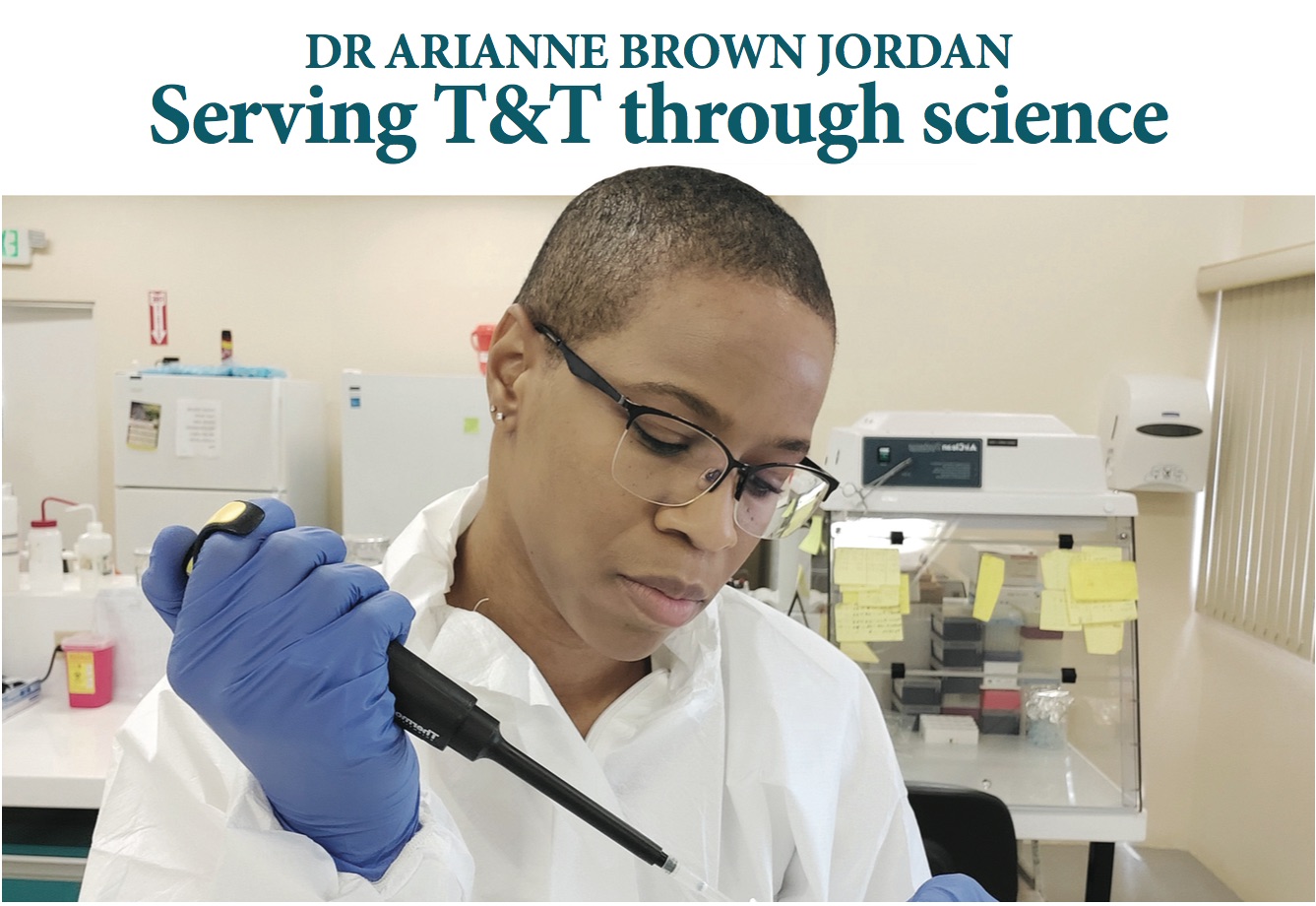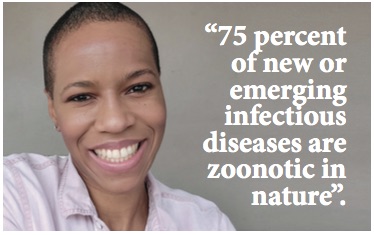
Dr Arianne Brown Jordan, member of UWI St Augustine’s graduating class of 2020, has been interested in the sciences since her secondary school days. Even though the field of virology had not been her dream then, she pursued her general studies with a passion to excel. Today, however, she has found herself at the centre of molecular based testing for SARS-CoV-2 in Trinidad and Tobago. Dr Brown Jordan is a member of the Ministry of Health team in the fight against the pandemic, where she is a critical member of the national molecular testing response team.
“I consider myself a molecular virologist and a laboratory specialist with the knowledge that has really benefited my colleagues and the institutions and clients we serve,” she says.
Molecular based testing, of which polymerase chain reaction (PCR) is a principal method, detects the presence of a virus in an individual. It is currently considered the most accurate test for diagnosis of SARS-CoV-2 infection. During the height of the pandemic, Dr Brown Jordan and her team were able to outfit and man the UWI lab that launched SARS-CoV-2 PCR diagnostics in T&T, to meet the initial demand for reliable test results. This was critical to support national policies such as tracking, efficient isolation, and quarantine.
It was a challenging time, but Brown Jordan made it work, both through her own internal resources as well as the training and support from UWI.
She entered the institution at the PhD level in 2013 to pursue her degree in Veterinary Microbiology. Originally, Brown Jordan sought to be part of a Molecular Genetics programme under the Department of Pre-Clinical Sciences in the Faculty of Medical Sciences, spurred on by her love for viruses and molecular biology. Previously graduating with a Bachelor’s degree in Life Sciences from the School of Arts and Sciences at St George’s University in Grenada, she describes this as the pivotal experience that led her academic direction.
“I sat in the microbiology class… and I just fell in love with viruses,” she says, describing the moment during her final year of study in a virology lecture by Professor Joanna Rayner.
As for veterinary microbiology, the fates aligned when she came across the call for PhD students by then newly minted UWI Professor Christopher Oura. She saw it as an opportunity to expand her repertoire of important viruses.

Her research project during the time spent at the UWI “primarily focused on a variety of avian viral diseases, surveillance of viruses of economic importance, and veterinary health focus in both poultry [and] wild bird populations”, she says.
Dr Brown Jordan has had novel results in several first-author papers published in peer-reviewed journals, and has worked with the Ministry of Agriculture (specifically the Poultry Surveillance Unit and the Wildlife Section), and various other stakeholders, including a collaborating World Organisation for Animal Health (OIE) and Food and Agriculture Organisation (FAO) national reference laboratory in Italy.
“She is really a great example of a UWI graduate at their best - carrying out excellent and important research that has a direct impact [on] the livestock industry in T&T in her PhD and then going on to use the knowledge and skills that she has learnt to serve her country during this critical period,” says Chris Oura, who is a professor of Veterinary Virology at the Faculty of Medical Sciences
For Dr Brown Jordan, the gap between St. George’s and UWI was filled by an MSc in Medical Microbiology at the London School of Hygiene and Tropical Medicine and an initial stint at the Trinidad Public Health Laboratory in the Ministry of Health. Upon submitting her thesis in 2018, she applied for an HIV related laboratory coordinator position at the Ministry and returned there, where fate had it that she would serve during the pandemic.
Like influenza, rabies, dengue and chikungunya to name a few, COVID-19 is reported as a zoonotic disease which is linked to origins from an animal source. Within her study of medical microbiology and veterinary virology, Dr Brown Jordan examined such zoonotic viruses. Zoonotic diseases (zoonoses) are defined by the Centre for Disease Control and Prevention (CDC) as “diseases that are caused by germs that spread between animals and people”.
The significance of studying zoonotic diseases is paramount to preventing future pandemics, she says, as up to “75 percent of new or emerging infectious diseases are zoonotic in nature”. With an estimated 1.7 million undiscovered viruses that currently exist in mammals and avian hosts, with over 600,000 of these having the ability to infect humans (according to the Intergovernmental Science-Policy Platform on Biodiversity and Ecosystem Services) Workshop on Diversity and Pandemics in 2020, Professor Oura sums it up well:
“Veterinary research is very important… critical in the process, because if you can control and stop these pathogens coming through the animals and into humans, you… avoid the death and destruction and massive financial consequences.” Infectious disease experts around the world like Peter Daszak, a Disease Ecologist who attempted to warn the world about the next pandemic after SARS hit in February of 2003, would agree.
The lesson: if we are not careful and simply revert to the way things were, with surveillance and monitoring programmes, before COVID-19, then we are awaiting the next pandemic. This underlies the significance of veterinary research to the health of humanity as we continue to erode the buffer between ourselves and wildlife.
It is UWI, through its postgraduate programmes with alumni like Dr Brown Jordan that produces the next generation of specialists and game changers that are teeming with the desire to be of service to society.

As a woman in Science, technology, engineering, and mathematics (STEM), she says, “I personally had great support around me [through] Professor [of Molecular Genetics and Virology] Christine Carrington and [Director of the School of Veterinary Medicine] Dr Karla Georges, as well as many female colleagues and fellow researchers who definitely made my experience as a woman in STEM one of ease.”
She urges both women and girls who have an affinity for STEM, or anything really, to “go for it” as “there are no limits except for the ones we put on ourselves”.
As for hobbies, she says, “I love to sew… I started making dolly clothes as a child”, and this has been her mainstay throughout the years and even now is a creative outlet. Dr Brown Jordan still carries her love for fashion and sewing with her, and attempts to incorporate this in her business ventures and hobbies alike.
Like the rest of us, Dr Brown Jordan tells of the difficulty of adjusting to life under the introduction of COVID-19, with the addition of longer hours at work and more demanding home life. The “balancing act with many twists and turns along the way,” as she describes it, has allowed her to be more dependent on God, her husband, family, and friends to cope with the times. Even so, she is spirited in her pursuit of capacity building and laboratory diagnostics, so it seems that there are milestones left for her in her future roles in the field of Virology and infectious disease laboratory strengthening.